Written by Stefan Sencerz, Contributing Writer, Classical Wisdom
In Wim Wenders’ movie, “Wings of Desire”, Peter Falk is credited as “himself” but really represents a fallen angel, the angel who had rejected his angelic nature, ceased to be but a spirit, and acquired a human body with all that it entails. In the film, angels “see” the world in black and white instead of in color like humans, a beautiful poetic device first adopted by Michael Powell and Emeric Pressburger in their romantic fantasy “A Matter of Life and Death”.
To me, my sensations are what make me feel human. The first sip of hot coffee in the morning, a gentle kiss of a breeze on my neck, feeling the taut strings of a stunt kite tugging on my arms. Or falling in love: holding hands, a dance late into night, the smell of her hair, the magical moment right before our lips meet, the soft alabaster of her skin under my touch. This is how we, mortals, perceive and relate to reality.
To angels, all that could be but a set of highly abstract mathematical equations and complex geometrical figures. We surely feel their calm, soothing love but we humans are also creatures of passion. And passion is what they seem to lack. In turn, maybe sometimes angels need our passion, too. That’s what the character played by Falk seems to imply. Let me explain.
One of the biggest problems for a theist, the so-called “problem of evil”, concerns an apparent tension between God’s perfections (i.e., that God is all-good, all-powerful, and all-knowing) and the fact that bad things happen even to good people.
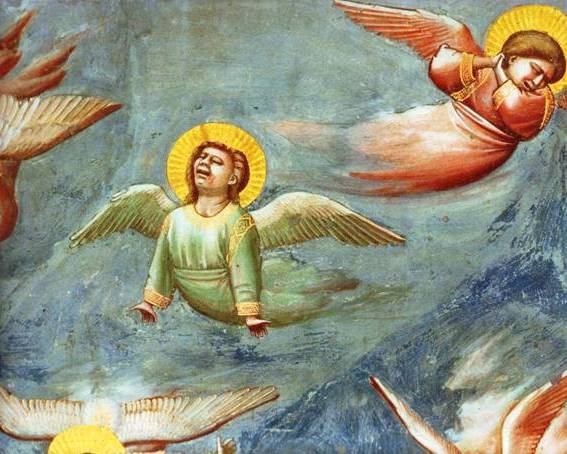
Detail of angels from Giotto’s Crying Angels, Lamentation of Christ fresco, Padua, Scrovegni Chapel, 1305-13
One of the most important responses to this problem, originally put forth by the second century Greek theologian Irenaeus, is known as the “virtue or soul-making defense”. The gist of this defense is to postulate that bad things happen to us because they are necessary to build up our character. We need pain to develop empathy and compassion, obstacles are necessary to build up fortitude, those less fortunate to perfect generosity and the sense of justice and fear to become truly courageous.
This relatively simple response has some obvious problems. Namely, why do we have to struggle before fully realizing our potential? Why are we not created with already fully-developed characters? Isn’t it all some kind of cruel test or, even worse, a bad joke? Thus, the original form of virtue defense seems to require additional explanations.
The 20th century philosopher, theologian, and exponent of the virtue defense, John Hick, attempts to provide some answers in his seminal book “Evil and the God of Love” (1966). Hick postulates that developing virtues is more valuable than being created as already a fully developed being. To use a metaphor, the journey to reach the mountain top is more valuable than being magically transported there just to see magnificent sights. He also postulates that character growth must be based on genuinely free choices, choices that involve free will.
Now, free will seems incompatible with coercion. Force and even a reliable threat of using it seem to undermine our freedom. Thus, Hick postulates, God has to be somehow hidden from us; there must be some “epistemic distance” between God and his creation. Otherwise, we would be motivated by fear of God’s retribution rather than by a genuine desire for good. Consequently, our choices would be coerced and not truly free.
In order to preserve this “epistemic distance”, God cannot intervene into human affairs too much, too obviously, and too openly. Too much help and too many miracles could give us certainty about God’s existence and plans. Remember, a dissolution of the “epistemic distance” from God would seriously undercut our free will. This is why God cannot remove every problem or obstacle that we may encounter. This is why, sometimes, we encounter difficulties that seem insurmountable.
Now, to return to angels, perhaps— like us— they are not yet fully realized, “completed” or perfect beings. Maybe they still have some work to do to actualize their potential, maybe they still have some mountains to climb. As paradoxical as it may seem, perhaps God maintains some “epistemic distance” from them, too. Otherwise, if they were fully in the presence of the Divine with the full understanding of God’s immense powers as well as his plans, could we really make sense of their fall? Could we really understand how they are able to make choices? Could we really comprehend how angels, too, seem to have free will?
Well, you could respond, can angels truly evolve if they are disembodied? Don’t they need pain, obstacles, doubts, and fear to fully develop their natures? Angels seem to lack all of this.
Thus, perhaps, something about them needs to thaw and open up too, so they can transcend their sophisticated yet sterile mathematical ideas and ethical imperatives and start using their senses and hearts.
Maybe, to be truly happy, to truly flourish, to fully realize their potential, angels too have to learn how to feel and not just how to reason. Perhaps this is the only way to transcend the world of “black-and-white”.
In Wender’s film, angels sometimes climb up high towers of churches and hang out on roofs of the tallest buildings as if waiting for the gift of a dawn. But there is always a price to be paid for not having senses. No matter how high they climb, no matter how high they fly, they’ll never see the flaming, crimson-orange rays of the setting sun.
End of Part 2 of 4


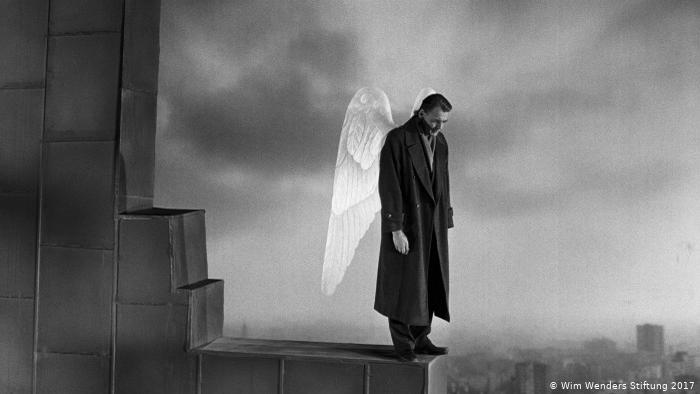
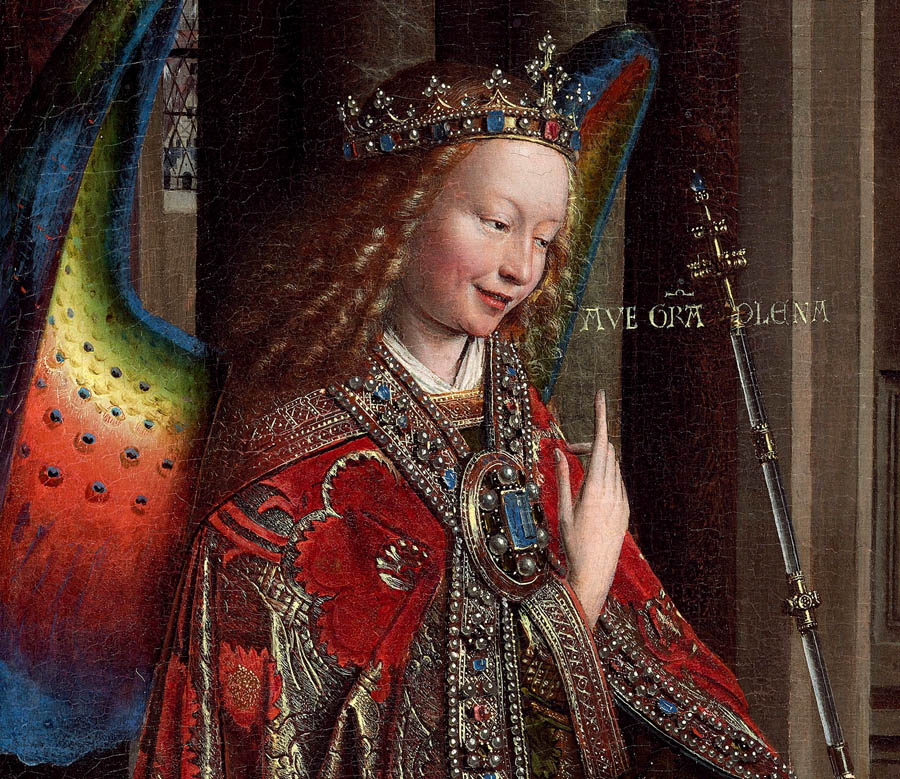
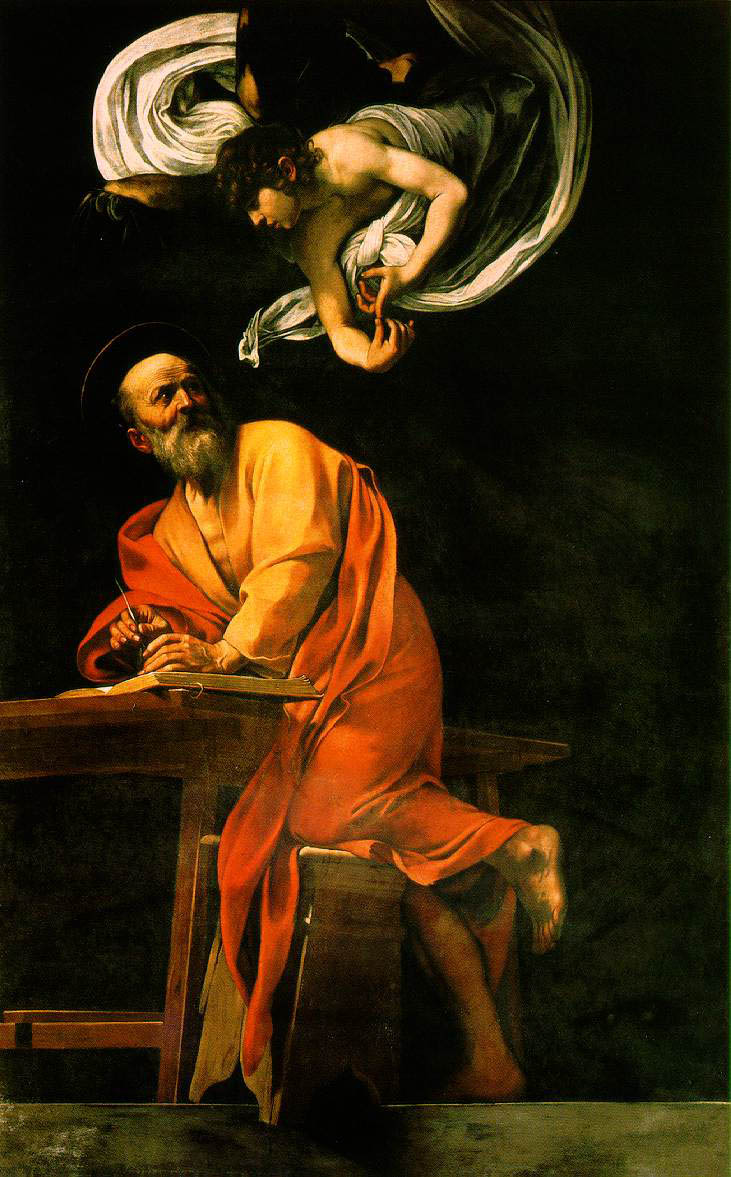
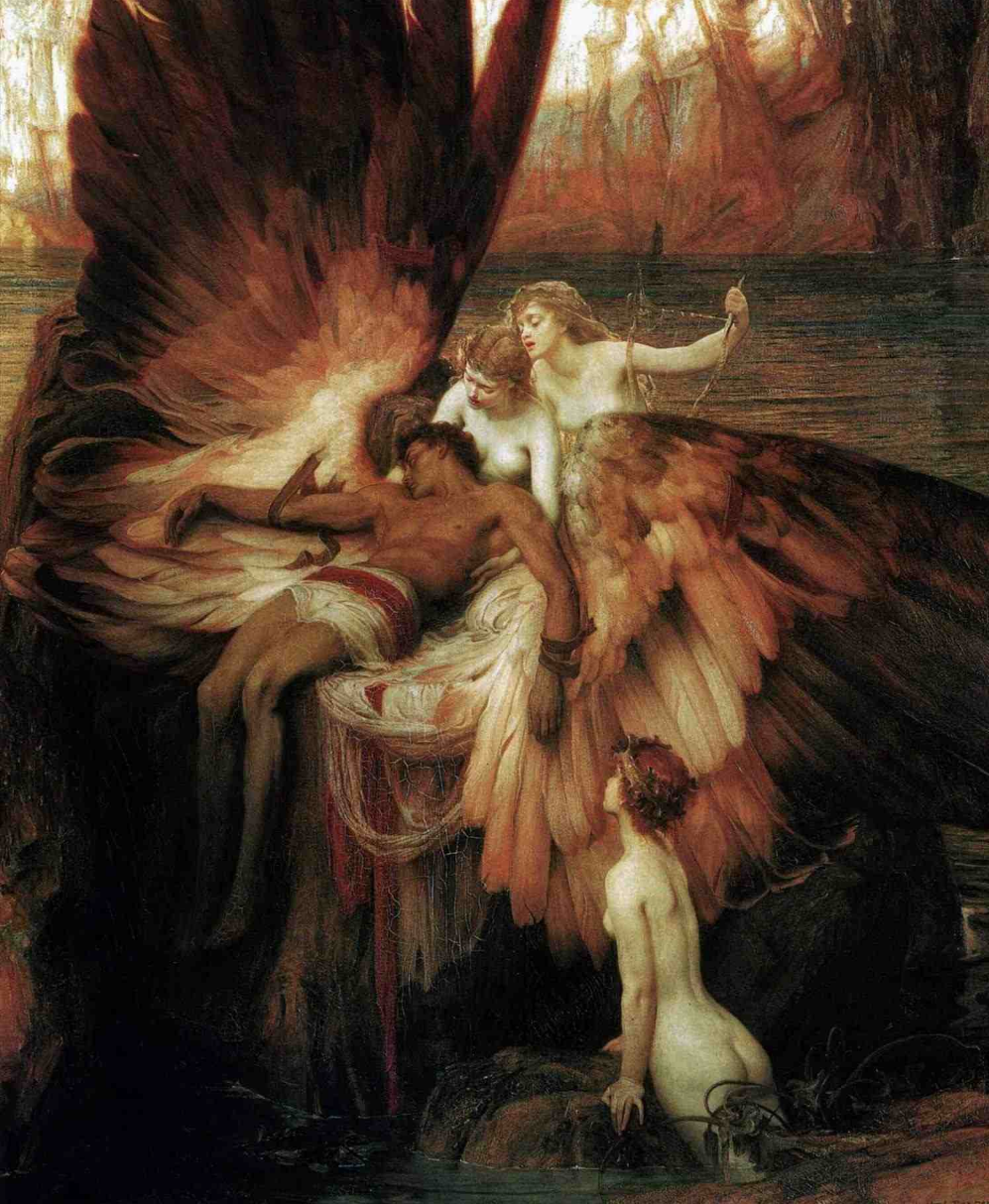
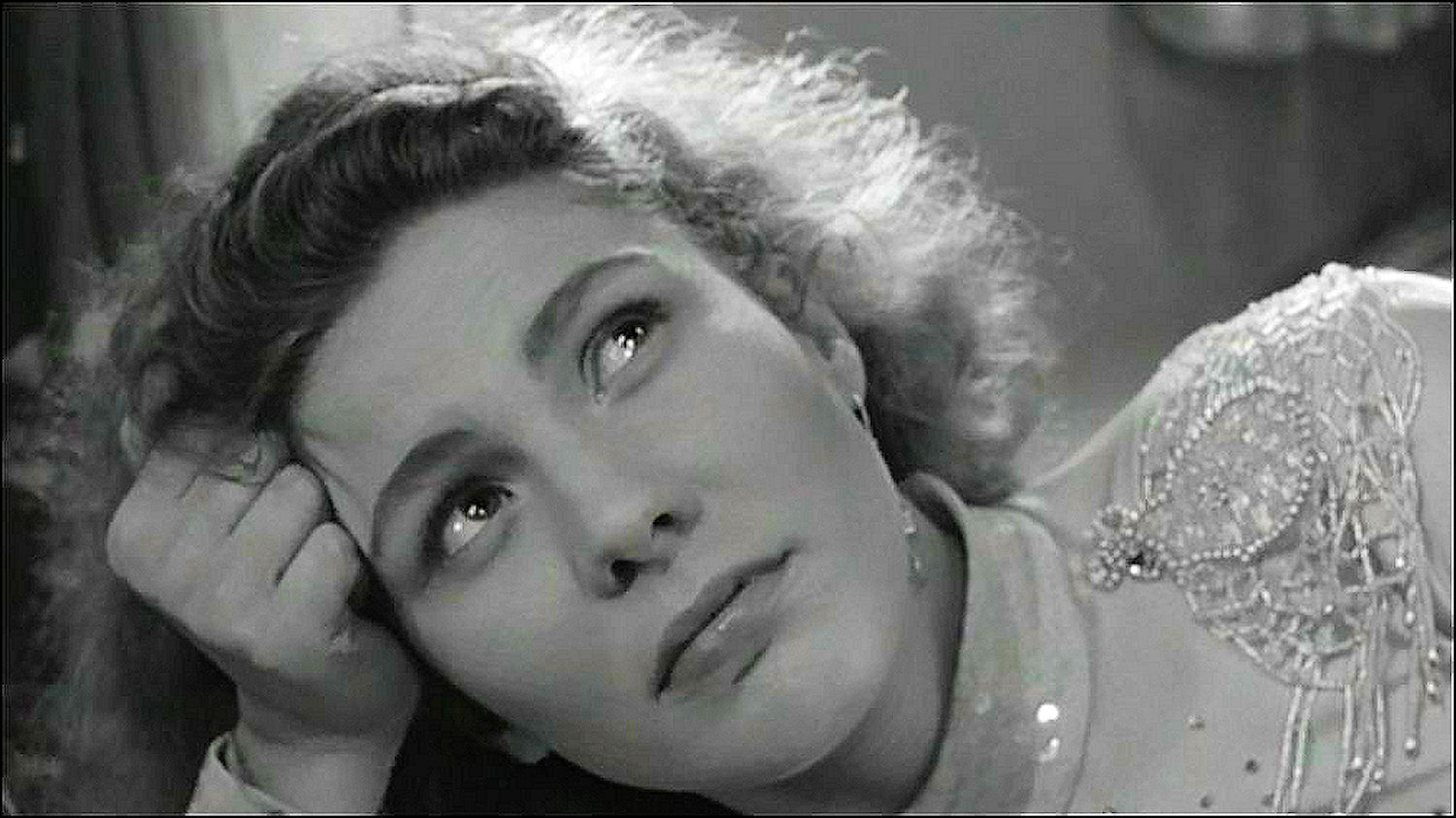








3 comments
This essay was coming in bits and pieces over a long period of time. Interestingly, the fragment that came out first is most “poetic” or “literary”; it is also most “me”, so to speak. I work from it backward to Western and Middle-Eastern myths and forward to Eastern myths. For various reason it is not included in this rendition of the essay. Perhaps, one day, it will appear as a free-standing piece. Meantime, I post it as a comment.
III
Sometimes angels fall.
They fall in love.
When an angel falls, it is not a small matter. Angels fall badly and deeply. Interesting things happen then, like thunders and lightning, sometimes even a rain and then a double rainbow. Some of the angel’s parts fall, too; that is, they fall off and then fall, for example their wings. Also, they lose all of their accessories, starting with their armors, shields, and swords and ending up with their clothes and underwear. It is not all bad, really. If you are clever and not just mathematically inclined, I mean, if you can see beyond the world of algebra into the world of supply and demand, you may realize that your armor and shield are nice commodities that can fetch you a hefty lump of cash. Not a bad start on a new path to becoming fully human.
When angels fall, not only do they lose their armors, clothes and all the rest, they also take upon human bodies. Now they have to learn everything from scratch including how to control parts that even for a mature human being are so darn hard to control. At first even their best efforts fall short, are humorous, sometimes even outright comical. They stand out there completely naked in those brand new beautiful human bodies and it all really shows. They are like teenagers who cannot hide anything. I still remember when, being a young and immature man, I was forced to pull myself through some moments of real awkwardness. And I was wearing clothes.
Now, imagine a naked ex-angel facing the same predicament. For the first time in his life, he has been burnt by the sun, or bitten by a mosquito, or his tummy tells him something but he has not the slightest clue what it is, except that it hurts. Up to this moment no sensations at all but now his body is aching and itching. It’s got to be seriously frustrating, yes?
Some of them, those who are really wise, understand why they have fallen, the whole process of falling, and what comes next. They take it slow and easy, easy as if it’s a Sunday morning. They taste the waters step by step; they don’t lose their heads. They may even have a premonition that it is but the beginning of a long process and that the best is still to come. But some are pretty confused, freak out, run away and splash against the walls they used to be able to penetrate at will in their immaterial angelic “bodies”. After all, they are not angels any more, now they are made of physical stuff and, truly, physical bodies sometimes really, really hurt. So, they need to learn fast how to take good care of their new endowment.
Fortunately, fallen angels have really good looks; it’s one of the perks of being an angel in a previous life. They are Peter Falk kind of good looking, especially when he was young. I mean it in a very sincere flattering way; I am not envious about such things.
Good looks frequently help. Just imagine that someone whom you deeply and passionately love sees you completely naked and you have no control at all over what happens to your body. Fortunately, you have a choice to look like a young Peter Falk or like, say, a Rush Limbaugh. I surely know what I would prefer. But I digress. What I am trying to say is merely that a transition from being an angel to being a human is difficult and that it definitely feels weird, especially to an angel. That’s all.
Perhaps I missed something, but on what basis is it assumed that angels are cold, mathematical thinkers? Similarly, that they see only in grayscale, and cannot appreciate the beauty of a sunset?
A good question, issac42.
:P
Philosophically (I am a professional philosopher), it seems to me it might go either way. That is, it seems to me that disembodied minds (angels), could have what philosophers call “qualia” and what we could call “feels” (or maybe even sensations”). Roughly, a quill is how the perception of color appears from a purely subjective point of view; say, the perception of “redness” feels to me when I see something that, collectively, we refer to as red.
:P
Intuitively, however, (and also to some extend philosophically) and in terms of human physiology, quailia seems very closely related to senses. Consider a though experiment involving someone who has been blind since birth and never seen anything red. It is very plausible to say that a) such a person could intellectually grasp or understand the concept of colors yet, b) she would not have an experience of seeing red and does would not have a qualia (or feels) like a normally seeing persons have.
:P
Now, by extension: angels are pure spirits, they do not have material bodies. So, arguably, they would not “see” like we see. They would not have feels or quaila.
:P
All of this is a bit speculative, of course. I would understand if you disagreed.
:P
Poetically and metaphorically, I wanted to create a contrast between humans and angels. In this respect, I tried to follow the lead of Wenders.
:P
In his movie the angels are a bit dispassionate and emotionless. And, some of them, miss having emotions, senses, having a sip of hot coffee, and all the good stuff we have in our human life. And some of them chose to tease being angels and become humans.
:P
Some of the angels fall.
:P
They fall in love. (See my note above.)
Trackbacks
Our apologies, you must be logged in to post a comment.